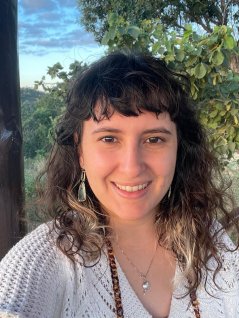
Event
SG - Do it Yourself: More-than-Human Decision-Making
After all the discussions about adopting a more-than-human perspective, you may be curious about what that experience would feel like. How do you go about including, representing and embodying non-humans?
About Do it Yourself: More-than-Human Decision-Making
After all the discussions about adopting a more-than-human perspective,
you may be curious about what that experience would feel like. How do you go about including, representing and embodying non-humans? Tonight is your chance to experience what going beyond a human-centred approach could be like. Immerse yourself in this interactive workshop, and become part of a ‘Council of Care’!
Created by PhD researchers Adriana Ressiore and Gabriela De La Rosa, this participatory and art-based method has been in development and experimentation since 2021. In this process, participants engage in a mock decision-making exercise that invites humans and non-humans to participate in the discussion. The Council's primary goal is to explore how to include those typically excluded from mainstream decision-making processes while making the process enjoyable, sparking creativity, and keeping care as a guide. The Council of Care aims to cultivate collaborative, ethical, socially just, and open-minded decision-making by challenging established hierarchies between humans and non-humans.
Be part of this quest and exploration for a more-than-human approach! If you are open to a change of perspective and fancy something special for your Thursday evening, this is your call!
Please note that due to the format of the workshop, only a limited number of people can participate. If you are curious and motivated to take part, reserve your spot by sending an e-mail to info.sg@wur.nl
(priority is given to WUR-students)!
Why would you join?
- You’ll experience firsthand what it’s like to participate in a decision-making process where humans and non-humans discuss as equals.
- We’ll explore together what it means to make care a key guide in decision-making.
- We’ll share learnings from previous sessions, and you’ll have the chance to reflect on stepping into someone else’s shoes (including a non-human).
- And of course, we hope you can leave inspired, while having some fun along the way!
What to expect?
This two-hour workshop includes several involves multiple steps, including check-in,situating the participants in the case and place, interactive and reflective embodiment, the council discussion, and generative harvest and check-out. By joining the Council of Care you will be expected to engage and participate.
Background
The method draws inspiration from various practical and theoretical approaches, including the Council of All Beings (Seed et al., 1988), Theater of the Oppressed (Boal, 2005), and Matters of Care (Puig de la Bellacasa, 2017).
Currently, the creators are working on an academic article to explore the challenges and potentials of the Council of Care as a tool for promoting transdisciplinary collaboration and caring decision-making. By reframing participants' perceptions of agency, this arts-based method helps us better understand, include, and transform the roles of human and non-human beings toward a more participatory and caring future.
Do I need to prepare in advance?
Not at all. But if you are interested and not familiar with the issue to be discussed in the Council —the oil spill off the coast of Brazil — you could read the following articles to gain a better understanding of the scenario and the location we’ll be imagining during the Council of Care (optional):
- Article on the impacts of oil on animals and fishermen (Portugese)
- If you want to learn more about Siribinha, the place we will be transported to:
About series Rethinking Human-Nature Relationships
In recent years, there has been a growing interest in the role and agency of non-human actors, including other beings, ecosystems and landscapes. Initiatives that advocate for a more-than-human perspective gain traction, embracing post-anthropocentric thinking, as well as concepts like non-human rights and multispecies justice. These efforts challenge traditional views of nature and aim to empower non-human natural entities, such as farmed animals, coral reefs, and rivers.
In this series, we’ll explore this paradigm shift and how it invites us to rethink humanity’s place in the natural world. What explains the rising attention for the ‘more-than-human’, and what does it mean to empower non-human nature in practice? We’ll look at real initiatives that strive to better represent non-humans. To what extent do they contribute to meaningful change and what can we learn from them?
About Adriana Ressiore Campodonio

Adriana's research works with the concept of more-than-human care, particularly in Brazil, with the aim of bringing marginalised humans and non-humans into environmental policy discussions and decision-making. Her work contributes to feminist debates on care and more-than-human perspectives from a Global South standpoint. With an academic background in International Relations, Social Sciences - specialisation in Arctic Studies - and International Development Studies, she is passionate about fostering dialogues across different knowledge systems, both locally and internationally, and challenging human-nature dichotomies. Her work seeks to create participatory, political, and embodied research while challenging traditional modern rationalities. Adriana is currently a PhD Candidate at the Knowledge, Technology, and Innovation chair group at Wageningen University & Research in the Netherlands. Her research is part of the research project entitled Global Epistemologies and Ontologies.